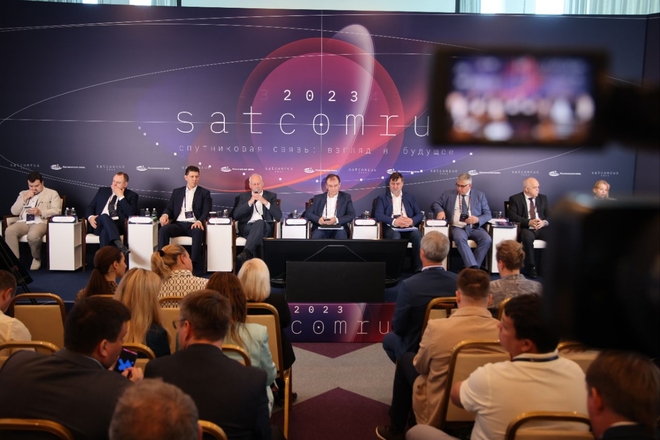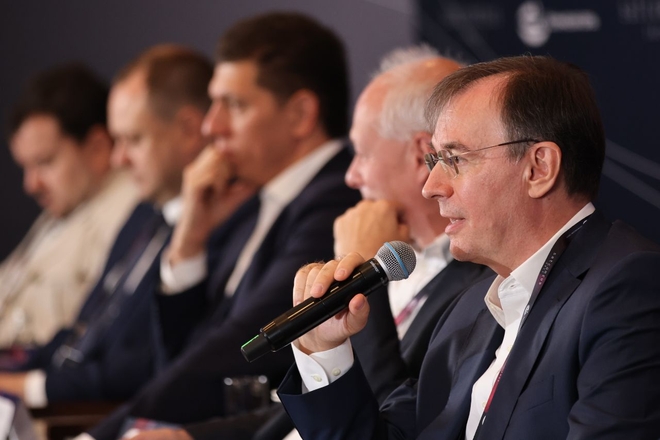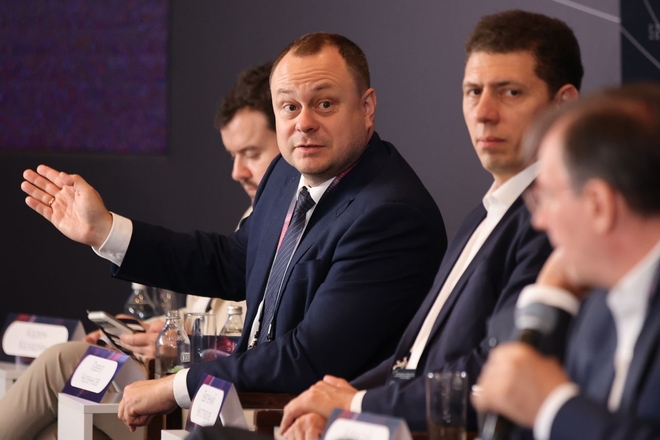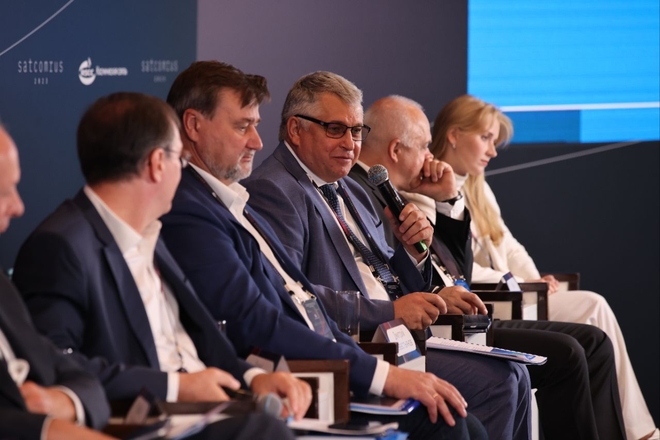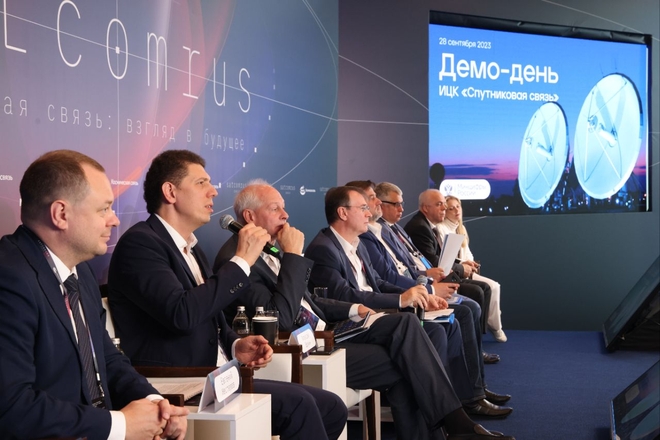Space architects: satellite industry experts presented development strategies and space telecommunications market prospects until 2035 at SATCOMRUS 2023
The Russian satellite communications industry has recovered from last year's shocks and entered a new phase of development. This conclusion was drawn by the participants of SATCOMRUS 2023 international conference and the Demo Day of Satellite Communications ICC held within the framework of the event. Both of them took place on 28 September in Astrakhan with more than 250 industry experts as well as a thousand online viewers attending them.
The plenary session was opened by Alexey Volin, Director General of RSCC, Chairman of the specialized Industry Competence Centre. He outlined the most prominent trends in the global and Russian space telecommunications markets. One of the landmark trends of 2023 was that foreign operators did not want to entirely leave the RF market, although they reduced the share of their presence there.
"Competition in the market has remained, as has the interest of foreigners in working in Russia. RSCC retained contacts with foreign partners, including those in international markets. Foreign clients still make half of the total revenue of RSCC, we continue to provide services in almost 60 countries of the world", emphasized the Director General of Russian Satellite Communications Company.
Another important trend is the consolidation of market players, as well as protectionism and dumping by small national operators seeking to launch their own satellites into space. This affects the market quite strongly and creates a highly competitive environment, says Alexey Volin.
At the same time, the price of creating spacecraft continues to rise. In Russia, this is caused by the change of currency rate and the fact that, as part of the transition to import substitution, domestic manufacturers are forced to create new solutions and developments from scratch.
Yury Urlichich, Adviser to Director General of RSCC, Chairman of the Council of the Association of Satellite Communications Market Players, who moderated the SATCOMRUS plenary session, also mentioned important tasks to be solved in ensuring technological independence.
"I would like to see the 35 established ICCs enabling our country to strengthen the industrial backbone of the economy and supporting the telecom industry. This can be facilitated by projects, for example, on chips, which we are currently lacking - the processors needed in all the computing devices. Ideally, they should be built on domestic architecture. Furthermore, beamforming chips are needed which is a key chip in creating an active phased array antenna (APAA). Such a chip provides antenna beam control, creating the necessary amplitude and phase relationships between the radiators," said Yury Urlichich.
Yury Urlichich specifically dwelt on the importance of developing the qualifications of Russian experts and independence from any country in terms of technologies. "People are the key. These are teams led by visionaries who will be able to bring promising projects to life. We have to take this way, clearly realizing that we have no other way. Hopefully, no one has an illusion by now any more that we will buy a payload, satellite or whatever. And it's important to realize that we can't get rid of dependence on one country and be captured by the dependence on another. It is necessary to implement our own projects in the field of space communications: it will give our country a multiplier effect in more than 10 industries," he concluded.
Alexey Volin, Director General of RSCC, specifically mentioned several drivers for the development of telecommunication services on the GEO. These include broadcasting and video content transmission, as well as the fastest growing segment - communications on the move and communications in remote areas. "On the one hand, the number of settlements in our country with no alternative to satellite, is constantly decreasing, as fibre optic cables reach them. However, the volume of services rendered is not reduced, because consumption is growing, often exponentially," said the Director General of RSCC. Nevertheless, there are still places in Russia where FOCLs will never reach: these are remote, hard-to-reach settlements whose residents feel their "digital divide" from the city more than anyone else and are badly in need of high-quality communications and Internet access.
"This year, three of the company's satellites - Express-103, Express-AM5 and Express-AMU7 - are included in the Ministry of Digital Development’s programs to eliminate the digital divide. We are connecting another 100 settlements with a total of 20 thousand people. 300 MHz has been allocated for this task", summarized the Director General of RSCC.
Sergey Plugotarenko, Director General of the Autonomous Nonprofit Organization "Digital Economy", and Karen Kazaryan, Director of Analytics of the organization, focused on the issues of ensuring technological sovereignty with a strong involvement of space industry. In order to accelerate this process, it is necessary to promote the exchange of best practices between different industries. "The second important goal is to find export potential in solutions that are created in the Russian Federation as part of the import substitution process. We are now engaged in a dialogue with all the leaders participating in the roadmaps, trying to enrich expertise and help implement developments that are progressing well," said the Director General of the ANO "Digital Economy".
Sergey Plugotarenko also specifically noted the successful idea of holding the Demo Day of the Satellite Communications ICC within the event where all the most important industry players were represented. The vast majority of speeches and discussions at SATCOMRUS touched upon the issues and priorities of the Industry Competence Centre.
The industrial model of RESHETNEV JSC, according to their Director General Evgeny Nesterov, today focuses on reducing the cost and time of spacecraft manufacturing. "We have a strong focus on the manufacturing development; multi-satellite constellations are already the present, not the future. We have to build a perfect assembly line production that will allow assembling Gonets spacecraft in about 200 days with a cycle of a week and Marathon spacecraft in 15 days with a cycle of almost a day. We have already been developing automated warehouses, where robotic systems are used, and upgrading production operations with the help of various manipulators," said Evgeny Nesterov. "We are expecting to reduce the manufacturing time of the future spacecraft, which will be ordered by RSCC or GSS, by 30%, which, in turn, will affect the labour intensity and cost of work," he added.
In his report Oleg Ivanov, Director General of the Radio Research Institute, elaborated on promising technologies in space communications, including the creation of hybrid networks.
"Today, many operators, including OneWeb, Starlink and our Rassvet, follow the strategy of implementation of such a network where subscribers need intermediate terminals to use the services. But they are very expensive: for example, a group one costs up to 1 mln rubles, an individual one - up to 500K rubles. This type of hybrid networks tends to develop, however, in our opinion, ultra-low orbits have the greatest prospects. These are the systems that have the potential for mainstream use," says Oleg Ivanov. The best way, in his opinion, is to build hybrid networks at altitudes between 300 and 500 km with direct access to wearable subscriber terminals. "There are a lot of difficulties here, but it is possible to cope with them. And the projects will pay off when the subscriber does not need to have any additional device," concluded the Director General of Radio Research Institute.
Deputy Director General for Engineering Policy of JSC GLONASS Igor Chursin, in turn, spoke about the demand for satellite bandwidth in monitoring and telemetry throughout Russia. He also estimated the volume of vehicles that need to use satellite services.
"Today's market volume is 55 mln vehicles, small size vessels - 1.5 mln, category L and snowmobiles - 2.2 mln, light and ultralight aviation - about 30K,” said Igor Chursin. “As for small vessels: now we have closed the experiments on the Baltic Sea on the transmission of emergency warning through the "System-112". The experiment with the State Inspectorate for Small Size Vessels of EMERCOM was recognized as successful. We have about the same situation with light and ultralight aircraft: we have successfully performed these trials in the South Federal District".
Pavel Cherenkov, Director General of “Satellite system GONETS” JSC, mentioned in his speech the integration of multi-satellite constellations in the interests of end users and Russia's strategic objectives as the key objective in their building. "It is quite difficult to explain to the consumer what is flying on what orbit. You need to link everything together and provide the customer with an understandable product. The user needs a specific solution that is as adequate as possible to his economic expectations," he believes. According to him, the number of government digital products is growing exponentially, and this will require not only terrestrial infrastructure but also large data centres.
Pavel Cherenkov also spoke about the IoT market building specifics. "More and more companies conclude that the application of Internet of Things services is profitable and has a positive economic effect. It was surprising to us that over the last few years, many commercial firms have built their industry software around Gonets. These are proprietary systems that have increased traffic volume by nearly 100 times as compared to the situation three years ago. We are not talking about the sale of subscriber devices, but about the volume of traffic circulating in the network," Pavel Cherenkov pointed out.
Dmitry Sevastyanov, Director General of JSC Gazprom Space Systems emphasized that the satellites on the GEO will retain their important role in the next decade due to their ability to provide large capacity in regions with high demand and ensure the efficiency of delay-insensitive traffic delivery. And low orbit constellations, being a low latency environment with global coverage, offer new opportunities for users. There is room for all development models in the future marketplace. "Operators that will be able to become multi-service and create a Space as a Service system will gain a competitive advantage," says Dmitry Sevastyanov.
He added that GSS is expecting to build three optical observation satellites, six radar observation satellites and high-throughput satellite Yamal-502. It is also expected to launch the Yamal-501 to replace the Yamal-402 satellite, which will run out of fuel in 2025. It will take over the entire Russian customer base of its predecessor. The production of space systems will be realized on the basis of the Gazprom SPKA design bureau, which is being accomplished in Shchelkovo. The plant should already be operational this year.
Jana Harlan, Deputy Director General of Bureau 1440 LLC, shared the startup's plans for the few coming years: "In 2027, we are going to deploy the first generation of satellites in our constellation, which will provide global coverage and be able to deliver uninterrupted service anywhere on Earth. And by 2035 we will increase the number of spacecraft, increase the system capacity, provide more subscribers, increase the speed." She added that in terms of interaction with mobile and satellite operators, the company is ready for any cooperation scenarios. "As an example: a key challenge for us is to create cheap and efficient subscriber devices. In order to somehow resolve this task, we create an infrastructure based on open protocols and enable the system to support terminals of other manufacturers," shared the Deputy Director General of Bureau 1440 LLC.
After the plenary session, the event included Session 1 and Session 2 with the participation of representatives of the specialized Industry Competence Centre. Two startups of Satellite Communications ICC presented their projects on video encoding and precise point positioning. During the discussions experts debated over the potential of VSAT networks development on spacecraft with multibeam antennas, media content delivery and new platform solutions, changes in the modem equipment market in Russia, as well as the development and production of domestic satellite equipment. At the end of the event, the results of the industry award "SATCOMRUS AWARDS 2023" were summarized.
The SATCOMRUS 2023 conference is organized by Russian Satellite Communications Company and Tsifrodinamika LLC under the auspices of ANO "Digital Economy". The general partner of the event was RESHETNEV JSC.
